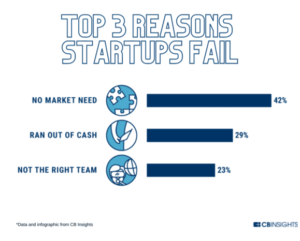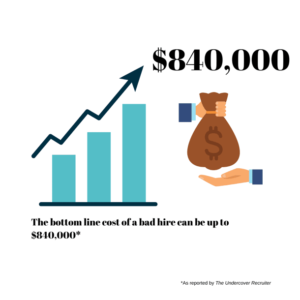How to Hire Your First Engineer as a Startup Founder

Introduction
According to a study by Shikhar Ghosh reported in Entrepreneur magazine, 75% of all VC backed startups fail.
CB Insights researched the top 20 reasons startups fail. Any guesses? You’d probably expect to see things like ‘failure to pivot’ or ‘poor marketing’ to be at the top, but those actually ranked much lower.

The Top 3 Reasons Startups Fail:
#1 No Market Need
#2 Ran out
of Cash
#3 Not the Right Team
The success of your startup not only depends on whether you can clearly convey how your product or service solves an important problem and your ability to raise enough capital; but you need to find and attract the right engineers who will share your vision and make it a reality.
Your founding engineer(s) will be involved in strategy, partnerships, and hiring other engineers – all while architecting and developing a product at a rapid pace. Needless to say, they will play a major role and greatly influence your entire organization as you scale. We spoke with Ade Adesanya, Co-Founder and President of Moving Analytics and recipient of Forbes 30 Under 30, and Joseph Gordon, Senior Executive Recruiter here at Kofi Group, regarding best practices for startup founders who are looking to hire their first engineer.
How Big Is Your Network?
There are two pools of candidates that founders typically rely on for their first engineering hires: ex-colleagues or friends and online applicants/referrals. Many startups are founded by members who used to work together or were introduced by ex-colleagues. This is a great option, and has worked for many startups, but it is limited by the size of your network. According to Y Combinator:
“Hiring someone you’ve already worked with is your best option because you already know if you’ll like working with them. How much you enjoy working with any single person matters less as you grow larger but for your first hire it could be the difference between persevering to success and shutting down the company. (Caveat: startups are also uniquely stressful environments and there’s still some probability you might not enjoy working with your friend under this kind of stress as much as when you were both at a bigger company).”
The other option is to find someone to hire through your extended network, a recruiter, or other means. All founding engineers will require a few fundamental strengths in order to succeed in this role.
Important Questions to Ask
- Are they Innovative?
It’s no good to hire the best technical person in the world if they can’t create and innovate in a fast-paced startup environment. - Do they have the temperament and determination?
Working in a startup often demands long hours, putting out unexpected fires, challenging your colleagues, and persevering through obstaclesand difficult trials. This isn’t a clock in at 8 and leave at 5 job. Nor is it going to have paid holidays and weekends off. This job is best suited for the entrepreneurial at heart. - Do they have the skills needed not just for today’s product but also for the future?
It’s difficult to foresee how the startup will grow and change with time but it’s important to make sure your investment into your founding engineer isn’t only good for the next 6 months. The business is likely to change and technical demands may change as well. Make sure they aren’t a one trick pony but instead are well versed in multiple skills you may need as you grow.
These questions should be asked of any potential hire for your founding engineer position regardless of if they are a colleague or a candidate presented by a recruiter.
Successful Founding Engineers Share These Traits
When asked what a founder should look for in their first engineering hire Ade Adesanya shared:
“You have to look for two things, one is the ability to build a product, but I think you need to hire a senior person. A lot of startups rely on their network or friends, but your first engineer should be someone who has full stack experience and the ability to design the architecture of your product. Many people build an MVP but accumulate technical debt as they try to scale without having a CTO or founding engineer in place”.
Can this individual build what I need? Is only the first question of many. A startup is a demanding enterprise and will need a founding engineer with robust technical skills, experience, and most of all a willingness to grow excitedly alongside the venture. This point is further driven by Joseph Gordon when he explains:
“In my experience, successful founding engineers have a good mixture of technical fundamentals, low ego, and team-spirited attitude. Identifying these character traits are critical when you are establishing your cultural environment of the engineering team. It sets the tone for everything else that happens as you continue to scale up.”
Is Your Opportunity Attractive Enough?
Before conducting any outreach, you’ll need to make sure your startup is appealing to the kind of person who would seek this position. Gordon shared with us from his engineering recruitment experience that:
“Founding engineers want to contribute to a project that resonates with them on a deeply personal level. The problem needs to not only be interesting but also has to be using a technology stack that allows them to leverage their current skill set and allow them to grow and constantly feel challenged.”
The right founding engineer will need a compelling offer to leave their current position and career. What is your startup in a position to offer? Adesanya adds:
“A big part of this is the stage of the company and how much they can pay to acquire the talent they want. Can you pay full market or structure a deal to attract the right employee? If you can’t hire them full time, have them as a consultant or advisor. Build something that can scale as you grow.”
Leverage Multiple Channels
If you know what youare offering is competitive and attractive, then you simply need to put the offer in front of the right people. How do you find the right founding engineer amongst the many out there? Adesanya provided these insights about how he and his co-founder built their technical team:
“We’ve used our network to find senior people, but we’ve also used recruiters to fill those roles…you want to have several channels.” Another option he recommends is, “leveraging our relationships with other founders, our board, and investor referrals…it always helps to hire someone who has previously worked with someone on your team.”
This brings up a great point. It is important to leverage your network by more than messaging a few people on LinkedIn but also using your network for referrals. Hiring people that come with a great recommendation and personal connection to you or someone on your team can really add to the synergy and team dynamic in a positive way.
In such a crucial position you may want to consider working with a recruiter if you have the budget to do so. Adesanya also cautioned about how fees can add up so you will need to plan ahead in your budgeting for that, but at the same time he noted that 3 or 4 of his engineers have come from recruiters and have been with his team for over 4 years. The benefit of working closely with recruiters is that they often know the market well and can add value to the process, if you get a good one. Unfortunately, not everyone puts the same level of quality into their work. When working with recruiters Gordon points out:
“Finding early engineering talent is very difficult, and very subjective to each environment. When engaging with recruiting firms be prepared to ask the appropriate questions about their process, and what value they will bring to you. Founders need to make sure that they are going to be getting quality engineers and not a resume dump. Getting a bunch of resumes that miss the mark and/or are lacking depth in the prescreening conversation can end up being a time drain and can be counterproductive in the long run.”

That being said, if a founder finds a quality firm it can greatly speed up the hiring process and free up time for other essential activities. Hiring your first engineer is crucial to your success as a startup and bad hires can be some of the costliest mistakes. Not only does hiring the wrong person cost you their salary but it also results in poorly made products and wasted time that can never be recouped. According to the US Department of Labor, a bad hire can cost up to 30% of their first year salary. An article on The Undercover Recruiter referenced a study which found that the bottom line cost of a bad hire can be up to $840,000 (for a manager earning $62k/year terminated after 2.5 years) when you factor in hiring costs, mistakes, lost business opportunities, severance, total compensation, cost of maintaining the employee, and other factors. Read about how we saved countless hours for hiring managers at early-stage startups.
Should You Hire A Professional?
One of the most important things in business is to prioritize your time to ensure that you’re spending the majority of it in your areas of strength. If budgeting, accounts payable, and receivables aren’t your forte then don’t be the accountant. If you aren’t a seasoned hiring expert, then a specialized recruitment firm can be an invaluable asset. The first engineer at your startup is a critical hire that you cannot afford to get wrong. Building the right team eliminates one of the top reasons startups fail and brings you that much closer to success.
Share This Blog
Kofi Group has helped 100+ startups hire software and machine learning engineers. Will fill most of the roles we recruit on with 5 or less candidates presented.
Contact us today to start building your dream team!


